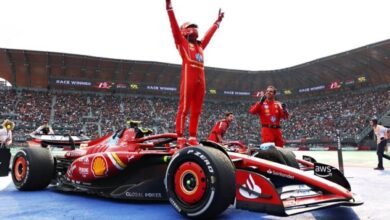5 reasons to watch The Ministry of Time
In this "golden decade" of Spanish series, The Ministry of Time has been one of the most successful.

We tell you why you should see ‘The Ministry of Time’. / Photo: youtube.com/HBO Spain
LatinamericanPost| Luis Angel Hernández Liborio
Escucha este artículo
Leer en español: 5 razones para ver El Ministerio del Tiempo
In a decade in which Spanish series have gained prominence, The Ministry of Time is one of the most successful in and outside of Spain. The combination of various elements such as history, drama, comedy, and time travel have been the ingredients to gain a legion of followers around the world: the "ministéricos".
Taking advantage of the premiere of its 4th season we show you five reasons to start watching this series that you can find complete for free on the official website of Spanish Radio and Television (RTVE).
1. Time travel
If you like series or movies about time travel you are in the right place, The Ministry of Time has managed to create and explain its own universe from these time jumps. This world has its own rules and its methods of moving through time through an ancient system of doors. The objective of the ministry is to protect the history of Spain from any external threat that wants to modify it to obtain a benefit. To do this, they form "patrols" that are in charge of avoiding or "correcting" attempts to modify time, as the head of the office says: "Our history (that of Spain) may not be the best possible, but it could be worst".
2. Drama, comedy, action and criticism, all in one
Time travel does not always turn out to be fun, the series is right to make deep criticism about the behavior of Spain throughout its history, especially when those problems are still present in its current life. Slavery, religious intolerance, the inquisition, invasions, the decline of the Spanish Empire, the Civil War, republicanism, fascism, xenophobia, machismo and homophobia, topics that Andrés Moraleda of El Confidencial calls "swamps" are shown throughout the series through the stories of fictional and real characters. On the other hand, the series also has brilliant moments of comedy, action, espionage and secret societies, the production has worked at all levels and it shows on screen.
Also read: Thrillers: here are some tricks used to scare you
3. More people have become interested in history and art
Can you imagine Lope de Vega as a trending topic on Twitter? A difficult task at a time when Game of Thrones was in competition. Well, the Ministry of Time has succeeded, according to the newspaper La Vanguardia, the series has triggered Google searches for history and art. Cultural issues have managed to sneak into the main topics of searches thanks to this production. The series has made more people interested in history and culture, the "trick" has been to combine historical events, the adventures of the characters, and the careful production seen in the costumes and special effects. Only here we could see Diego Velázquez and Pablo Picasso talking.
4. Historical figures
The history of Spain is certainly not limited to the current territory, at some point it was said that it was "the empire where the sun never set" due to its enormous size. So if it is or was Spanish territory it is part of its history, thanks to this we can see chapters in Cuba, the Philippines, Gran Colombia or the Conquest of Mexico. You will also find characters from universal history who have had something to do with Spanish history, here are some of those that appear in the series:
Artists: Diego Velázquez, Miguel de Cervantes, Lope de Vega, Federico García Lorca, Pablo Picasso, Salvador Dalí, Francisco de Goya, Benito Pérez Galdós, Gustavo Adolfo Bécquer, Luis Buñuel, Alfred Hitchcock, Harry Houdini, and William Shakespeare.
Politicians and nobles: Isabel "la Católica", among other monarchs, Christopher Columbus, Tomás de Torquemada, Francisco Franco, Simón Bolívar, Jerónimo de Aguilar, Gonzalo Guerrero, Napoleón Bonaparte, Adolf Hitler and Heinrich Himmler.
Alonso y Pacino tienen una nueva misión en “El Ministerio del Tiempo”: evitar un atentado contra Simón Bolívar. Lunes 9 de oct. en @La1_tve pic.twitter.com/gsbCf3sMDK
— Juan Pablo Shuk (@jpshuk) October 6, 2017
5. A "transmedia" series
The immense number of "ministries" that have connected with the series have enabled the production to create additional and interactive content for The Ministry of Time, thus expanding its universe from the small screen to reality. It is not that the concept is new, the interesting thing is that the production has seen the transmedia part as an element as important as the episodes. Thanks to this they have created material for social networks, podcasts, certificates, dynamics, they have invited their followers to be extras in the series and more. The result has been that The Ministry of Time has become a phenomenon in social networks that quickly manages to position itself in content display, trending topics and even support from its followers when the series has found itself in trouble to be renewed. According to RTVE, only in April, before the premiere of the 4th season, the previous three seasons were seen by more than two million people only on its official page, without counting the other platforms where it has a presence.
Hoy es el día, 22:40 la hora…#ministericos #ministericas la patrulla está de vuelta en @MdT_TVE. No dejaremos que nadie nos moleste para disfrutar cada escena, cada diálogo, cada mirada…ya qurda menos tic tac, tic tac!!!!! pic.twitter.com/2EjbVg2bZY
— Patricia Maroto Polo (@pmppato80) May 5, 2020




